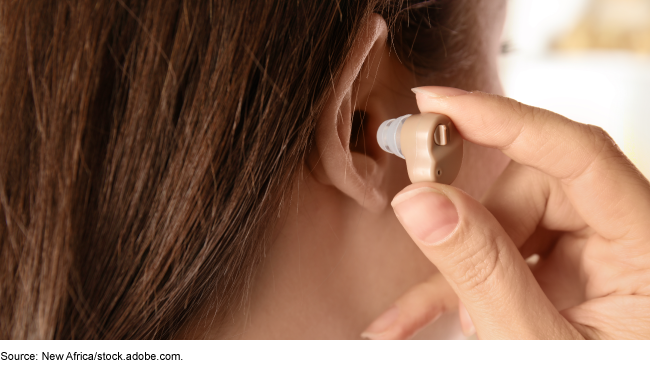Over-the-Counter Hearing Aids: Information on the New Medical Device Category
Fast Facts
Millions of Americans with hearing loss could benefit from hearing aids. This Q&A report looks at over-the-counter hearing aids, which have been available for purchase since October 2022.
Before then, people had to visit a licensed professional to get a hearing aid, which was a barrier to access for many. Additionally, health insurance often doesn't cover the expensive devices.
Early research suggests that OTC hearing aids can be effective for people with mild-to-moderate hearing loss. But FDA officials and stakeholders said it's too soon for data on how OTC hearing aids affect access. Stakeholders said access barriers—including cost—remain.

Highlights
What GAO Found
Approximately 38 million American adults have reported some hearing loss, and an estimated 29 million U.S. adults could benefit from using hearing aids. Historically, hearing aids were unaffordable for many consumers, as they were available only from a licensed professional and were often not covered by health insurance. In August 2022, the Food and Drug Administration (FDA) finalized a Rule allowing certain hearing aids to be sold without the involvement of a licensed professional—that is, over the counter (OTC)—beginning in October 2022.
FDA is responsible for ensuring that medical devices sold in the United States provide reasonable assurance of safety and effectiveness and do not pose a threat to public health. OTC hearing aids are subject to the same FDA premarket reviews and postmarket oversight as other medical devices. For example, FDA conducts surveillance of OTC hearing aids after they are marketed, including monitoring of reported adverse events (i.e., injury from the device or performance issues).
GAO's literature search identified 12 studies on patient access to hearing loss treatment following the market availability of OTC hearing aids in October 2022. Early research has suggested that OTC hearing aids can be as effective as prescription hearing aids and, as a result, may expand access to hearing loss treatment for those with mild-to-moderate hearing loss. However, FDA officials and six of the eight stakeholder groups GAO interviewed said it was too early after implementation of the Final Rule to have data on its effects. In addition, research and external stakeholder groups reported that barriers to accessing hearing loss treatment continue to exist, even with the availability of OTC hearing aids, namely consumer preferences and professional concerns, difficulty assessing hearing loss, and affordability.
Why GAO Did This Study
Hearing aids, like other types of medical devices, are overseen by FDA, an agency within the Department of Health and Human Services. A hearing aid is a small electronic device worn in or behind the ear that makes some sounds louder. Generally, OTC hearing aids use the same fundamental scientific technology as prescription air-conduction hearing aids but are available to consumers 18 years and older without a prescription or the involvement of a licensed professional. OTC hearing aids are intended for individuals with perceived mild-to-moderate hearing loss.
GAO was asked to examine consumer access to hearing loss treatment following FDA's issuance of the OTC hearing aids Final Rule. This report describes what OTC hearing aids are, FDA's rulemaking process for creating the new OTC category for hearing aids, existing research on the effect of OTC hearing aids on access to hearing loss treatment, FDA's and other federal agencies' oversight of OTC hearing aids, and the key issues relating to OTC hearing aids.
GAO reviewed literature and agency documents and interviewed FDA and Federal Trade Commission (FTC) officials and a selection of eight stakeholder groups representing consumers, audiologists and hearing professionals, and the hearing aid industry. GAO selected the eight groups by identifying professional, industry, and consumer protection groups that submitted public comment on FDA's Proposed Rule, conduct relevant work on hearing loss treatment and technology, and provide a diverse perspective on hearing health issues.
For more information, contact John Dicken, Director, Health Care, DickenJ@gao.gov, (202) 512-7114.
